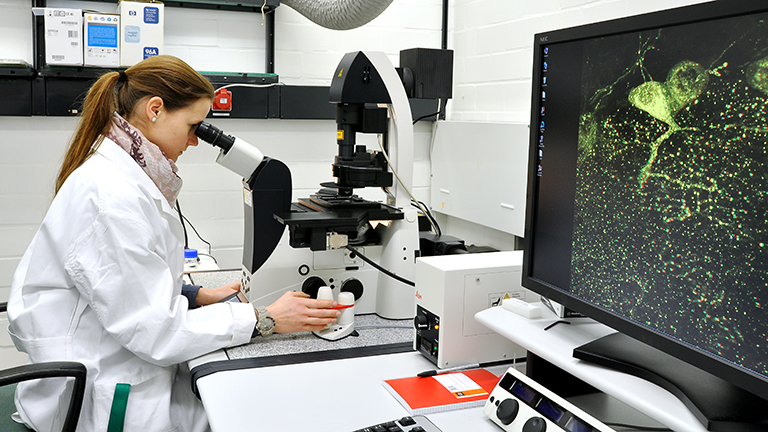MD Programme

Our MD Programme is a one-year programme for medical students of Ruhr-Universität Bochum who are interested in conducting an experimental MD project with a neuroscientific focus within SFB 874.
In addition to the research, the programme includes participation in selected qualification courses. The doctoral students receive optimal research support from SFB 874 and are integrated into its network and activities. A credit point system allows the participants to monitor their progress during the course of the programme. After completing their doctorate successfully at the RUB Medical Faculty, graduates of the MD Programme receive a certificate.
Candidates who meet the eligibility requirements can apply for a monthly scholarship of 861€ plus 103€ for material resources. The maximum funding period is one year. Students can also participate in the MD Programme without receiving the scholarship.
CURRICULUM
The curriculum of the MD Programme is operated under the auspices of the International Graduate School of Neuroscience (IGSN). The courses are held in English and can be easily integrated into the participants’ research activities. The curriculum includes the following elements:
- Practical and methodological courses (e.g. how to apply for an ethics approval, imaging techniques, optogenetics, molecular-biological methods, MATLAB, or machine learning),
- Journal club (discussion of latest scientific publications),
- State of the art symposia with international guests,
- Conference attendance.
In addition, students can take part in the lecture course “From Molecules to Cognition” as well as in interdisciplinary courses and soft skills trainings (e.g. on animal ethics, science communication, or career development).
METHODS
- Behavioural paradigms,
- Biochemistry,
- Brain imaging,
- Cellular physiology,
- Confocal microscopy,
- EEG,
- Electrophysiology,
- Repetitive transcranial magnetic stimulation,
- Animal models,
- Cell cultures.
CHOOSING AN MD PROJECT
The MD projects are thematically embedded within the projects of SFB 874 and are supervised by our principal investigators. The faculties of medicine, psychology and biology are particularly involved.
In the following you will find current examples of MD projects. You are also welcomed to introduce your own ideas within the research focus of SFB 874, or to design a project together with one of our principal investigators.
Examples for MD Projects within SFB 874:
Read more- Investigation of the influence of serotonin on visual information processing in mice
Supervisor: PD Dr. D. Jancke
Methods: Optogenetics, optical imaging, transgenic mouse models, electrophysiology
- Investigation of experience-dependent neuronal immediate early gene expression in the temporal lobe following spatial learning in mice
Supervisor: Prof. Dr. D. Manahan-Vaughan
Methods: Fluorescence in situ hybridisation, behavioural learning paradigms, transgenic mouse models
- Exploration of brain structures involved in retrieval of sequential memories in rats
Supervisor: Prof. Dr. D. Manahan-Vaughan
Methods: Functional magnetic resonance imaging, optogenetics, behavioural learning paradigms, all in rats
- Neuroanatomical assessment of the corvid brain and the brain structures involved in episodic learning
Supervisor: Prof. Dr. D. Manahan-Vaughan
Methods: Fluorescence in situ hybridisation, behavioural learning paradigms, histological staining and tissue fixation procedures
- Investigation of the role of synaptic/neuronal circuitry of the piriform cortex in synaptic encoding of experience
Supervisor: Prof. Dr. D. Manahan-Vaughan
Methods: In vitro electrophysiology (patch clamping), optogenetics
- Visual deprivation combined with modulation of cortical excitability via repetitive peripheral electrical stimulation (RES) of the index finger
Supervisor: Prof. Dr. M. Tegenthoff
Methods: Evoked potentials, psychophysical methods (two-point discrimination), tactile learning paradigm (RES)
- The influence of crossmodal tDCS over the visual cortex during somatosensory learning
Supervisor: Prof. Dr. M. Tegenthoff
Methods: Evoked potentials, psychophysical methods (two-point discrimination), transcranial direct current stimulation (tDCS), tactile learning paradigm (RES)
- The influence of crossmodal tDCS over the somatosensory cortex during visual learning over 4 consecutive days
Supervisor: Prof. Dr. M. Tegenthoff
Methods: Evoked potentials, transcranial direct current stimulation (tDCS), visual learning paradigm
ELIGIBILITY REQUIREMENTS
- Successful completion of the first four semesters of medical studies,
- Passed “Physikum” with a grade of 2.0 or better,
- Interest in the research fields of SFB 874,
- Commitment to engage in one or two research semesters and to conduct an experimental project,
- Good command of English.
APPLICATION
Applications are open to RUB medical students who fulfil the above-mentioned eligibility requirements. Please send the following documents in one PDF document:
- Letter of motivation, including specification of project preference (approx. 1 page in total),
- CV,
- Relevant certificates (at least copies of “Physikum” and “Abitur” certificates).
Applications can be submitted at any time by e-mail to Eva Gentes.
The acceptance into the MD Programme and the grant will be made by a committee of SFB 874, based on the written application and an interview with the potential supervisor of the project.
Please note:
Under the terms of the faculty’s standard regulations, it is required to register the start of your MD project at the RUB Medical Faculty. Upon completion of the thesis, it is to be submitted to the Medical Faculty, in accordance with the faculty’s regulations.
After successful completion of the MD curriculum and the medical doctorate, participants will receive a certificate from the International Graduate School of Neuroscience (IGSN) confirming their academic achievements. The certificates will be awarded at the annual Graduation Day of the IGSN.
